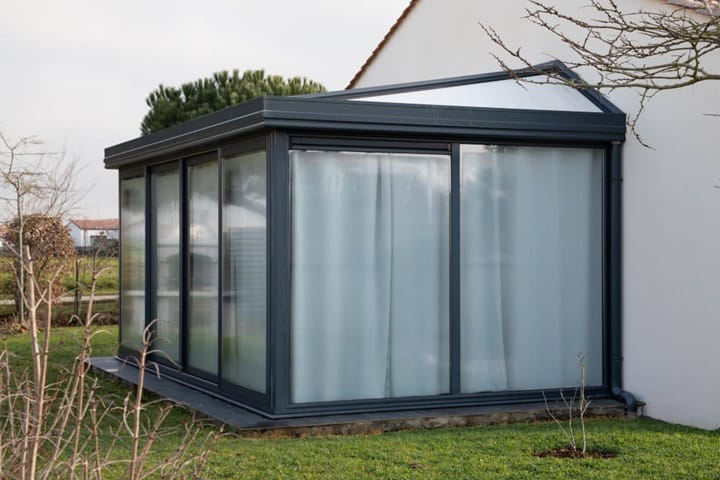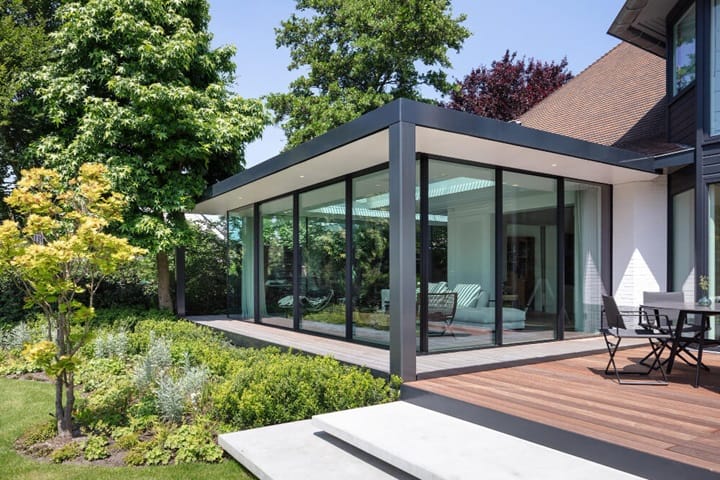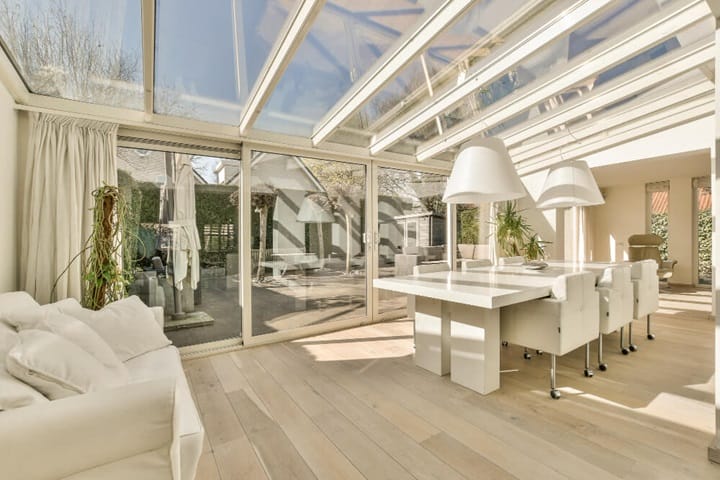Conservatory or extension? It’s a common dilemma for homeowners looking to add extra living space—but the right answer depends on more than just cost.
Sometimes, when you purchase a house, a conservatory or extension may have already been included. However, there are times when this is not the case, and you may want to construct one yourself, but which should you choose, and are both structures suitable for underfloor heating? In this article, we’ll help you decide between a conservatory or extension by breaking down the real differences, what each one offers, and how they work with underfloor heating.
Key Points:
- What are the key differences between a conservatory and extension?
- Which option works better with underfloor heating?
- Pros and cons of both, including cost and comfort
- Planning rules and whether you need permission
- How to choose the best option for your home and lifestyle
Conservatory vs Extension: What Sets Them Apart?
Start any conservatory vs extension debate by asking one thing: when does a bright garden room stop being a conservatory and turn into an extension? It all comes down to the build method, how the space connects to the house, and the rules it triggers.
Knowing the real difference between conservatories and extensions keeps your plans legal, comfortable, and aligned with your budget—whether you end up choosing a conservatory or extension.
A conservatory is usually defined by glass. At least three-quarters of the roof and half of the walls are glazed, usually resting on dwarf brickwork. Most units arrive as kits, can be bolted together in days, and—if under 30 m²—often avoid Building Regulations or planning hoops.
By contrast, an extension is built like the house itself: solid insulated walls, proper foundations, a tiled or flat roof, and a seamless doorway. Large panes and roof lanterns are possible, but the structure carries more weight, cost, and regulatory checks. Because an extension becomes part of the main envelope, it suits year-round living and water-based underfloor heating, enabling it to be more energy efficient for those looking for home improvements.
| Feature | Conservatory | Common Extension |
| Construction Materials | Glass, polycarbonate walls and roof | Similar materials to the existing home, solid roof and walls included |
| Natural Light | Very high natural light levels due to the glass structure | Lower roof due to the solid wall structure and roofing |
| Insulation | Light insulation but more natural lighting from included windows | Well-insulated |
| Planning Permission | Not essential | Sometimes required varying on house size and extension design |
| Usage | Great for light, open-aired spaces e.g., offices, dining rooms, lounge, etc. | Can be used for bedrooms, kitchens, bathrooms, and more |
| Construction Time | Shorter time frame to build | Longer build time due to extensive construction |
Extension or Conservatory? Key Factors To Consider

When deciding between a extension or conservatory for your home, here are seven main factors for you to consider:
- Hybrid alternatives and main usage– Some homeowners want the light of a conservatory with the comfort of masonry. Hybrid rooms—sometimes sold as “warm-roof” or “garden room” upgrades—swap the original glazed roof for insulated panels and plastered ceilings. Companies claim these replacements are up to five times more energy efficient than a 1990s build and still light enough to reuse existing footings. Timescales sit between the two routes: roughly 10–26 weeks from order to finish. Will it be a sunny reading nook or an all-season kitchen-diner? Ask yourself these questions when considering a conservatory or extension.
- Location on the plot – South-facing glass boosts winter warmth but can overheat in July; a shaded side return may favour masonry walls. Of course, this also depends on the direction of your house, and whether it is located on a hill, main road, isolated, or other environments.
- Budget – When calculating your budget, be sure to compare total cost per square metre, including glazing, heating, and finishes, then weigh extension vs conservatory uplift in resale value. Choosing a conservatory or extension often comes down to pounds-per-square-metre. A single-storey extension usually lands between £2,200 and £3,300 /m², depending on size, finish, and where you live. A lean-to uPVC conservatory can start at £6,000, while high-spec timber designs can top £40,000, but on average sit near £2,000 /m². Add demolition of doors, skip hire, electrics, flooring, and decoration to every quote. Does underfloor heating add value?
- Tolerance for disruption – A conservatory kit will usually be delivered in a number of weeks; however, building an extension or conservatory upgrade with steel beams can require months of planning and construction.
- Heating – When will you be using your conservatory or extension setup? If you plan to use them throughout the year, be aware that they may get warm quickly in the summer, and unnecessarily cold in the winter. Consider implementing water underfloor heating kits and other conservatory underfloor heating systems when preparing the groundwork to ensure that you save more in the long run.
- Paperwork and red tape – Regulations also steer the extension or conservatory decision. Most conservatories under 30 m² at ground level, separated from the house by exterior-grade doors and run on independent heating controls, are exempt from Building Regulations. Planning permission is rarely needed if height, width, and garden coverage stay within permitted-development limits. Extensions, however, must meet Part L energy targets, gain building-control sign-off, and sometimes require full planning.
- Deadline – Need space before Christmas? A prefabricated conservatory wins. Have time to spare? A bespoke extension rewards patience.
Pros and Cons of Conservatory vs Extension

When deciding between a conservatory or extension, carefully considering the benefits and drawbacks side by side helps you see which option really suits your plans, budget, and comfort needs.
Benefits of Choosing a Conservatory
- Planning-friendly: Most lean-to or Victorian designs fall within permitted-development rules, so paperwork is minimal.
- Speed: Factory-built kits slot together quickly, often watertight in a fortnight.
- Budget control: Prices are usually fixed upfront, so surprises are rare.
- Garden connection: Floor-to-ceiling glass brings in daylight and views that a solid extension can’t match.
- Low disruption: Construction stays outside the main house; no knock-through dust cloud.
If you want an extra place to sit, dine, or keep plants without months of building work, a glass room is also a favourable option. That said, understanding the difference between conservatory and extension is vital before signing a contract that will impact your house in the long run.
Conservatory Drawbacks to Note

- Temperature swings: Glass rooms overheat in July and feel chilly in January without shading and electric mats.
- Limited privacy: Large panes can leave you on show to neighbours.
- Lower resale uplift: Adds curb appeal, but not as much square-foot value as an extension.
- Cleaning chores: Roof panels and wide panes need frequent washing.
- Usage limits: Unsuited to bathrooms or bedrooms, and storage can be tricky along fully glazed walls.
Benefits of Choosing an Extension
- Flexible size and shape: Go deep, wide, or double-storey—your wallet and planning limits are the only guards.
- All-year comfort: Brick walls, roof insulation, and wet underfloor heating maintain steady temperatures.
- Design freedom: Render, brick, cladding, roof lanterns—tailor it to match or modernise the house.
- Value boost: A well-built extension often returns 10–20 % in added resale value.
- Layout overhaul: Knock through walls to create a full open-plan kitchen-diner; a conservatory or extension can’t both remodel and expand, but the extension can.
Extension Downsides That Matter
- Higher spend: Even modest single-storey projects cost more per square metre than most conservatories.
- Disruption: Trenches, scaffolding, and interior knock-throughs can last months.
- Red tape: Building Regulations sign-off is mandatory; full planning may be needed too.
- Time overrun risk: Weather, material delays, or design tweaks can stretch timelines and budgets.
How We Can Help
At Underfloor Heating Trade Supplies, you’ll find everything you need to keep your new conservatory or extension warm and comfortable year-round. From low profile underfloor heating systems ideal for retrofit projects, to complete wet and electric underfloor heating kits, our range suits all build types and budgets.
If you’re unsure what underfloor heating system is best, check out these guides on electric underfloor heating installation or troubleshooting with problems with underfloor heating. Every product comes with expert advice and fast UK delivery. Contact us today for further information.
It’s Time To Choose – Is A Conservatory or Extension Right For You?
So, extension or conservatory? If you need fast, affordable garden views with minimal fuss, the conservatory wins. But if you want a room that feels like part of the house, keeps an even temperature, and lifts property value, bricks trump glass when it comes to choosing an extension over a conservatory. The real choice lies in how you’ll live in the space, how much you’re ready to spend, and how long you can tolerate builders on site.
FAQs
Which is easier to heat: a conservatory or an extension?
An extension is easier to heat long-term due to its solid walls, insulated roof, and better thermal performance. Conservatories lose more heat through the glazing and need higher-output electric systems to stay warm, especially in winter.
Can underfloor heating go in any conservatory or extension?
Yes, but the type of system matters. Electric underfloor heating is ideal for conservatories and smaller spaces, while water-based systems work better in larger extensions. For projects with limited floor height, low profile underfloor heating kits are a great solution.
Does an extension always add more value than a conservatory?
Usually, yes. A well-built extension that integrates with the house and adds usable living space can boost property value by 10–20%. A conservatory may improve aesthetics and light but typically adds less value in financial terms.
Sources
Checkatrade. (2024) How much does a house extension cost in 2024? [online] Available at: https://www.checkatrade.com/blog/cost-guides/house-extension-cost/ [accessed 27/06/2025]
Planning Portal. (2022)) Conservatories: Planning Permission [online] Available at: https://www.planningportal.co.uk/permission/common-projects/conservatories/planning-permission [accessed 27/06/2025]
